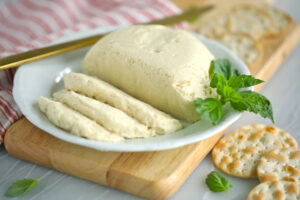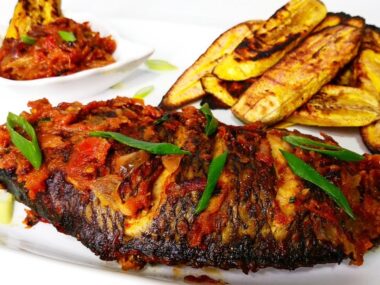Vegan cheese is a plant-based alternative to traditional dairy cheese, crafted to provide a similar texture and flavor without the use of animal products. It has gained popularity as more people adopt vegan or dairy-free diets.
Ingredients
- Base Ingredients:
- Nuts: Almonds, cashews, and macadamias are commonly used for their creamy texture.
- Soy: Tofu and soy milk are popular bases for vegan cheese.
- Coconut Oil: Adds richness and a smooth consistency.
- Potatoes and Carrots: Sometimes used for texture and color.
- Thickeners and Emulsifiers:
- Tapioca or Arrowroot Starch: Contributes to the stretchiness of some vegan cheeses.
- Agar-agar or Carrageenan: Used as gelling agents to create firmness.
- Nutritional Yeast: Adds a cheesy flavor.
- Flavorings:
- Garlic, Onion, and Spices: For savory varieties.
- Lactic Acid or Vinegar: Mimics the tanginess of dairy cheese.
Types of Vegan Cheese

- Soft Cheese:
-
- Cashew Brie or Almond Cream Cheese: Creamy and spreadable alternatives.
- Vegan Feta: Often made with tofu or almonds.
- Hard Cheese:
- Almond or Cashew Cheese Blocks: A firmer, sliceable option.
- Vegan Cheddar: Mimics the sharpness of traditional cheddar.
- Melty Cheese:
- Shreddable Mozzarella: Used for pizza and melting applications.
- Nacho Cheese: Often made with a base of cashews or potatoes.
- Aged Cheese:
- Aged Nut Cheese: Fermented and aged for a more complex flavor.
Commercial Brands
- Daiya: Known for its meltable cheese shreds and slices.
- Violife: Offers a variety of cheese alternatives, including blocks and slices.
- Miyoko’s Creamery: Known for artisanal vegan cheeses made from nuts.
- Follow Your Heart: Produces a range of vegan cheeses, including shreds and blocks.
Homemade Recipes
- Cashew Queso: Made with soaked cashews, nutritional yeast, and spices for a creamy dip.
- Tofu Ricotta: Combines tofu with garlic, lemon, and herbs for a versatile ricotta alternative.
- Vegan Parmesan: Often crafted from nuts, nutritional yeast, and garlic powder for a savory sprinkle.
Considerations
- Texture and Melting Properties: Achieving the right texture and meltability can be challenging but has improved with advancements in vegan cheese production.
- Nutritional Content: While vegan cheese provides an alternative for those with dairy allergies or dietary preferences, it’s essential to consider nutritional content. Some varieties can be high in fat and salt.
- Flavor Variety: Vegan cheese comes in a range of flavors, from classic cheddar to herb-infused varieties, offering diverse options for different culinary applications.
Culinary Uses
- Pizza and Pasta: Shreddable and meltable vegan cheeses work well in classic Italian dishes.
- Sandwiches and Wraps: Sliced vegan cheeses add flavor and texture to sandwiches and wraps.
- Cheese boards: A variety of vegan cheeses can be presented on a cheeseboard with fruits, nuts, and crackers.
Challenges and Future Developments
- Texture and Meltability: Mimicking the texture and melting properties of dairy cheese remains a challenge, but ongoing research and development are addressing these issues.
- Sensory Experience: Achieving a satisfying taste and mouthfeel that compares to traditional cheese is an ongoing area of improvement.
In summary, vegan cheese has evolved significantly, offering a wide range of flavors and textures.
While it may not replicate the exact qualities of dairy cheese, it provides a delicious and cruelty-free alternative for individuals with dietary restrictions or those choosing a plant-based lifestyle.
The market for vegan cheese continues to grow, with innovations in taste and texture enhancing the overall culinary experience.










